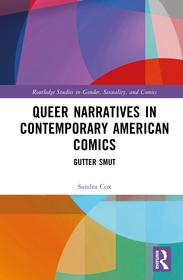
The Social Genres of Comics
Impact and Innovation of Comics in Social Sciences
Sorozatcím: Sociology of the Arts;
-
20% KEDVEZMÉNY?
- A kedvezmény csak az 'Értesítés a kedvenc témákról' hírlevelünk címzettjeinek rendeléseire érvényes.
- Kiadói listaár EUR 139.09
-
57 687 Ft (54 940 Ft + 5% áfa)
Az ár azért becsült, mert a rendelés pillanatában nem lehet pontosan tudni, hogy a beérkezéskor milyen lesz a forint árfolyama az adott termék eredeti devizájához képest. Ha a forint romlana, kissé többet, ha javulna, kissé kevesebbet kell majd fizetnie.
- Kedvezmény(ek) 20% (cc. 11 537 Ft off)
- Kedvezményes ár 46 150 Ft (43 952 Ft + 5% áfa)
Iratkozzon fel most és részesüljön kedvezőbb árainkból!
Feliratkozom
57 687 Ft

Beszerezhetőség
Megrendelésre a kiadó utánnyomja a könyvet. Rendelhető, de a szokásosnál kicsit lassabban érkezik meg.
Why don't you give exact delivery time?
A beszerzés időigényét az eddigi tapasztalatokra alapozva adjuk meg. Azért becsült, mert a terméket külföldről hozzuk be, így a kiadó kiszolgálásának pillanatnyi gyorsaságától is függ. A megadottnál gyorsabb és lassabb szállítás is elképzelhető, de mindent megteszünk, hogy Ön a lehető leghamarabb jusson hozzá a termékhez.
A termék adatai:
- Kiadó Springer Nature Switzerland
- Megjelenés dátuma 2025. szeptember 27.
- Kötetek száma 1 pieces, Book
- ISBN 9783031991844
- Kötéstípus Keménykötés
- Terjedelem239 oldal
- Méret 210x148 mm
- Nyelv angol
- Illusztrációk II, 239 p. 48 illus., 37 illus. in color. Illustrations, black & white 699
Kategóriák
Hosszú leírás:
This book analyzes social research and genres of comics from cross-cultural perspectives. It disentangles the impact of comics in understanding social, cultural and political issues and considers the challenges they may raise from an ethical point of view. In nine case studies focused on topics such as migration, science and technology innovation, urban sociology and criminology, the book aims to answer the following questions: How can the comic medium help understand research’s narratives? To what extent can comics can be incorporated within traditional social research steps? What body of knowledge is being created by research-based comics? How can they represent social class without eliminating it or reproducing its stereotypes and how they deconstruct, without removing the “color line” the cultural difference or the naturalization of gender corporality? What are the barriers (theoretical and methodological) that researchers might encounter using comics to communicate sensitive topics? What are the main ethical considerations researchers must consider? While, at first glance, comics-based research seems to be tied mostly to Sociology, Anthropology and Geography, it also is relevant to a host of other disciplines including cultural studies, feminist studies, environmental studies, disability studies, science and technology studies, critical race studies, queer studies and animal studies. This book will also facilitate international and interdisciplinary collaboration among researchers with an interest in exploring the utility and limitations of the graphic medium.
TöbbTartalomjegyzék:
"
Chapter 1: Engaging the Publics: Co-Creating Comics to Foster Public Engagement in Research and Innovation, Simone Arnaldi, Stefano Crabu, Paolo Magaudda.- Chapter 2: Playing with gender and sexuality in comics and zines, Rachele Reschiglian & Cosimo Marco Scarcelli.- Chapter 3: When comics meets health: Graphic Medicine, Veronica Moretti.- Chapter 4: Illustrating Labor: The Role of Graphic Social Science in Labour Sociology Giorgio Pirina, Francesco Pontarelli.- Chapter 5: Comics in Migration, Migration in Comics. Methodological Reflections and Theoretical Perspectives Emerging from the Analysis of Two Case Studies, Francesco della Puppa, Sarah Walker.- Chapter 6: Criminology in the Frame: Graphic Narratives and the Study of Crime Simone Tuzza, Sandra Sicurella, Massimiliano Mulone.- Chapter 7: Seeing the Unseen: Illustrating climate change through graphic, Valentina Cappi, Emanuele Leonardi.- Chapter 8: Comics as a Lens for Urban Research? Challenges and Potential of a Representational and Analytical tool, Adriano Cancellieri.- Chapter 9: Conclusions.
" Több





